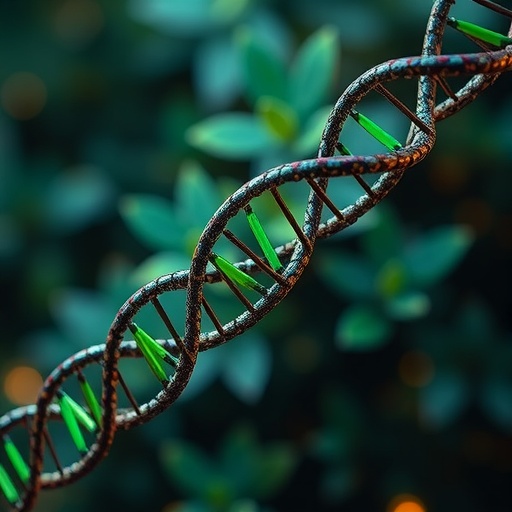The relationship between the endocannabinoid system and mental health is intricate and poorly understood, especially in clinical conditions such as anorexia nervosa. In a groundbreaking study, researchers led by F. Gilardini have unveiled significant findings that highlight how the dysregulation of two critical genes, CNR1 and FAAH, may drive endocannabinoid dysfunction in individuals suffering from anorexia nervosa. This paper, which will be published in the Journal of Eating Disorders in 2025, shines a new light on potential therapeutic avenues for a disorder that has long evaded effective treatment options.
Anorexia nervosa, characterized by severe restriction of food intake, an intense fear of gaining weight, and distorted body image, affects millions globally. The ramifications of this disorder are profound, impacting not just physical health, but also psychological well-being, often resulting in debilitating effects that can last a lifetime. While genetic factors have been implicated, the role of epigenetics in the condition has garnered attention recently, prompting researchers to explore how external behaviors and environmental factors can alter gene expression.
CNR1, the gene encoding the cannabinoid receptor type 1, plays a pivotal role in the endocannabinoid system, which is integral to various physiological processes, including appetite regulation and mood stabilization. On the other hand, FAAH encodes the enzyme fatty acid amide hydrolase, which is responsible for the breakdown of endocannabinoids. This research provides a cohesive narrative regarding how the disruption of these two genes can lead to adverse psychological outcomes, particularly in anorexia nervosa.
One of the intriguing aspects of the research is the implication that these gene-level changes are not simply random occurrences but may represent a coordinated response to various stressors. This dysregulation could serve as a biological marker that distinguishes those who are susceptible to developing anorexia nervosa from those who are not. The study suggests that heightened stress or trauma exposure could lead to epigenetic modifications in CNR1 and FAAH, pushing certain individuals toward a path of disordered eating behaviors.
Furthermore, this research dives deep into the mechanisms of how epigenetic modifications occur. The authors discuss how environmental factors, such as nutrition, stress, and emotional well-being, can lead to methylation changes in DNA sequences associated with these genes. These changes can effectively “turn off” genes that are crucial for maintaining a healthy endocannabinoid balance, thus promoting behaviors aligned with anorexia nervosa.
A significant finding of the study pertains to the epigenetic landscape surrounding the CNR1 and FAAH genes. By employing advanced genomic technologies, researchers were able to identify specific patterns of methylation that correspond to varying degrees of endocannabinoid dysfunction. This level of detail clears a path toward understanding how gene expression can be modulated in therapeutic settings, potentially leading to new interventions aimed at rectifying the dysfunctional endocannabinoid signaling often observed in patients with anorexia nervosa.
The implications of this study extend beyond mere academic interest; it raises crucial questions about the potential for targeted gene therapy or epigenetic interventions that could aid in treatment. If specific patterns of gene dysregulation can be effectively addressed, there may be a possibility for specialized treatment plans that go beyond traditional therapeutic methods, such as cognitive-behavioral therapy and nutrition counseling.
Moreover, the researchers indicate the significance of patient-tailored approaches, emphasizing that understanding the underlying genetic and epigenetic factors could enhance treatment efficacy. This aligns with a growing call within the field of psychiatry for more personalized medicine approaches that recognize the complexity of disorders like anorexia nervosa. Future studies could well lead to predictive models that could inform clinicians on which interventions are most likely to succeed based on an individual’s unique genetic makeup.
Importantly, while this research opens new avenues for exploration, it simultaneously underscores the multifactorial nature of anorexia nervosa. Mental health disorders, particularly those involving eating behaviors, are rarely rooted in a single cause. Hence, this study emphasizes that while the endocannabinoid system and its genetic underpinnings are crucial, one must consider the broader psychosocial components when aiming to understand and treat these complex conditions.
As awareness of the biological underpinnings of anorexia nervosa continues to grow, the integration of genetic research into clinical practice becomes increasingly vital. Recognizing the potential role of the endocannabinoid system in mental health disorders could transform current paradigms, offering fresh insights not only into anorexia but potentially other eating disorders and related psychiatric conditions.
In conclusion, the findings presented by Gilardini and colleagues mark a significant advancement in our understanding of anorexia nervosa. By illuminating the relationship between CNR1 and FAAH gene dysregulation and endocannabinoid system function, this research lays the groundwork for future investigations and therapeutic strategies. As we move forward, bridging the gap between genetic insights and clinical applications will be paramount in fostering improved outcomes for those affected by this challenging disorder.
As we await deeper investigations into the therapeutic implications of this research, it’s clear that the intersection between genetics, epigenetics, and mental health will play a critical role in shaping the future of anorexia nervosa treatment and perhaps even in extending our understanding to other mental health disorders.
Subject of Research: The epigenetic dysregulation of CNR1 and FAAH genes in anorexia nervosa.
Article Title: Coordinated epigenetic dysregulation of CNR1 and FAAH genes drives endocannabinoid system dysfunction in anorexia nervosa.
Article References:
Gilardini, F., Mercante, F., Sabatucci, A. et al. Coordinated epigenetic dysregulation of CNR1 and FAAH genes drives endocannabinoid system dysfunction in anorexia nervosa.
J Eat Disord (2025). https://doi.org/10.1186/s40337-025-01472-y
Image Credits: AI Generated
DOI:
Keywords: Endocannabinoid system, Anorexia nervosa, Epigenetics, CNR1, FAAH, Mental health.
Tags: advancements in eating disorder researchanorexia nervosa psychological effectscannabinoid receptor type 1 functionsCNR1 gene and anorexiaendocannabinoid system and mental healthenvironmental factors influencing anorexiaepigenetic dysregulation in anorexia nervosaFAAH gene and endocannabinoid dysfunctionfood intake restriction and mental healthgenetic factors in eating disordersimpact of epigenetics on gene expressiontherapeutic avenues for anorexia treatment





